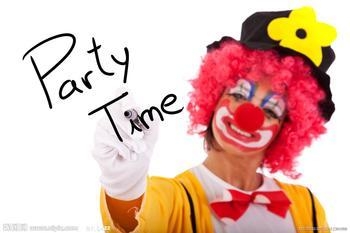(单词翻译:单击)
听力文本
Now, the Special English program WORDS AND THEIR STORIES.
(MUSIC)
Circus is a word with a long, interesting history. It is a Latin word that means "ring" or "circle."
One of the most famous places in ancient Rome was the Circus Maximus. It was a kind of round stadium with rows of seats all around the inside of it. Roman citizens gathered there to watch races, games and violent, bloody fights.
The modern circus developed in the nineteenth century. It was a travelling show of animals and people working under a large tent, later known as the Big Top.
Travelling circuses were popular in the United States and Britain before eighteen thirty. A circus moved from town to town, putting on shows with trained animals, acrobats doing difficult tricks, and funny, colorful clowns.
Circuses still travel from place to place. And they still have trained animal acts, acrobats and clowns.
Today's circuses usually have three rings. Something different takes place in each of the three rings at the same time. The heads of people watching a circus turn back and forth as they try to see every exciting act in each ring.
The circus has been popular for so long that it is not surprising that words and expressions connected with it are part of everyday speech.
For example, the word circus is used to describe any noisy place with a lot of activities going on.
A teacher may use it when she walks into a room where the students are playing and talking, instead of studying. She might say, "This place is a circus. Calm down and get your work done." And if the room is really noisy, she may say it is a three ring circus.
Clowns are a very special part of the circus. They look funny with their big red noses, painted faces and clothes that are much too large for them. Everyone at a circus loves to watch the clowns do tricks on each other. Clowns have a real purpose: to make people laugh. They always succeed.
We use the expression to clown around when we talk about someone playing tricks and making jokes. Usually, a person is clowning around if he is being funny when he should be serious. In that case, you may get angry and say, "Stop clowning around. This is a serious situation."
The most celebrated American circus in the eighteen hundreds was P. T. Barnum's "Greatest Show on Earth." Barnum's circus had many new acts. He began finding and training unusual animals, not just dogs and horses.
One of the most popular of Barnum's animals was a huge elephant named Jumbo. Jumbo was very large, much larger than other elephants. Soon, anything that was the largest of its kind was called jumbo.
Today, there are jumbo drinks, jumbo boxes of soap, and jumbo sales of cars.
(MUSIC)
This Special English WORDS AND THEIR STORIES program was written by Marilyn Rice Christiano. This is Bob Doughty.
VOA英文文本来自51voa,译文属可可原创,仅供学习交流使用,未经许可请勿转载。
参考翻译
(音乐)
现在是美国之音慢速英语词语典故节目。
Circus这个词拥有非常悠久,非常有趣的历史。这是一个拉丁词语,意思是“环”或者“圈”。
古罗马最有名的地点之一就是马克西穆斯角斗场。它是一个圆形的广场,广场内部四周都是成排的座位。罗马民众聚集在这里观看竞技,游戏和残忍,血腥的斗争。
现代马戏团兴起于19世纪,主要是一些动物和工作人员在一个大的帐篷,也就是后来的马戏篷(Big Top)里旅游演出。
19世纪30年代以前,旅行马戏团在美国和英国非常流行。马戏团从一个城镇到另外一个城镇,奉上经过训练的动物的表演,杂技和有趣的小丑。
现在马戏团仍然在各地巡回,仍然有经过训练的动物表演,杂技和小丑。
现在的马戏团分为三个场地,每个场地同时演出不同的内容。那些希望看到每个场地精彩演出的人的脑袋不时转来转去。
马戏团那么长时间以来都如此受欢迎,所以和这个词相关的表达方式经常出现在讲话中并不奇怪。
例如,circus这个词被用来描述有很多活动在进行的嘈杂的场所。
当一个老师走进教室,学生们没有在学习,而是在玩耍和说笑,她可能说,“教室成了马戏团(circus)了,安静下来,开始做作业。”如果教室实在太吵了 ,她可能会说教室是三个场地同时表演的马戏团(three ring circus)。
小丑是马戏团里非常特别的角色。他们有着大大的红鼻子,脸抹得花花的,穿着大大的衣服,很有趣。看马戏团表演的每个人都喜欢看小丑搞恶作剧。小丑的真正目的是让人笑,他们通常都很成功地做到了。
当我们说某个人搞恶作剧和讲笑话的时候,我们用clown around这个短语。通常情况下,如果一个人应该严肃的时候嬉皮笑脸,他就是在clown around。在这种情况下,你可能会生气地说,“不要嬉皮笑脸(Stop clowning around)。这是严肃的场合。”
19世纪美国最著名的马戏团是P. T. Barnum的“地球上最伟大的表演” 。Barnum的马戏团有很多新的表演。他开始寻找并训练不寻常的动物,并不只是狗和马。
Barnum马戏团的动物中最有名的是名叫Jumbo的一头大象。Jumbo体型很大,比其他大象大很多。很快,在同类中体型最大的就被称为Jumbo。
现在,有大型饮料(jumbo drinks),大箱肥皂(jumbo boxes of soap)和巨大的汽车销量(jumbo sales of cars)。
(音乐)
本期词语典故节目由Marilyn Rice Christiano编辑。我是Bob Doughty。
词汇学习
1.circus n.马戏团
My real ambition was to work in a circus.
我的真正理想是在马戏团工作。
2.stadium n.体育场,运动场
They crowded through the gates into the stadium.
他们挤过大门,涌入运动场。
3.acrobat n.杂技演员
The acrobat rushed out from behind the curtain by turning somersaults.
杂技演员翻着筋斗从幕后冲了出来。
4.succeed vi. 成功
If at first you don't succeed, try, try again.
初试不成功,努力勿懈怠。
内容解析
1.It was a travelling show of animals and people working under a large tent, later known as the Big Top.
afterward(s), later
这两个副词均有“后来,以后”之意
afterward(s)与later的不同之处有两点:
afterwards指一整段时间之后,一般不分具体时间连用,而later常指一个具体的时间点之后。
afterward(s)强调事物的先后顺序,而later侧重“迟、推迟”。
2.A circus moved from town to town, putting on shows with trained animals, acrobats doing difficult tricks, and funny,colorful clowns.
put on上演;举办;展出
The band are hoping to put on a UK show before the end of the year...
那个乐队希望年底之前在英国举办一场演出。
3.Calm down and get your work done.
calm down (使)平静下来;(使)镇定下来
Calm down for a minute and listen to me...
你安静一会儿,听我说。
4.They look funny with their big red noses, painted faces and clothes that are much too large for them.
much too太…;非常…
She's much too fond of the sound of her own voice.
她总是说个不停。


